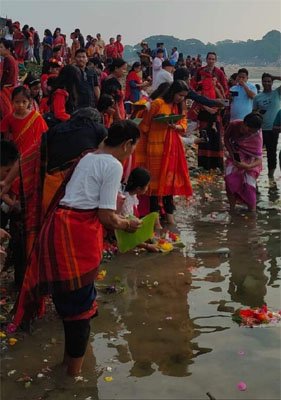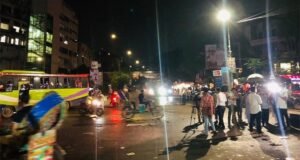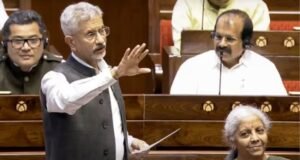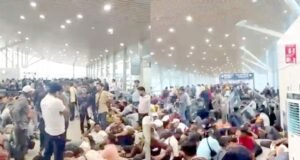
A three-day long Boisabi festival, the traditional New Year festival of different ethnic communities living in the hilly districts of Khagrachhari, Rangamti and Bandarban, began on Friday morning, floating flowers in Kaptai Lake in Rangamati.
This Boisabi festival is known as Baisu in Tripura language, Sangraing in Marma language and Biju in Chakma-Tanchangya language.
With this festival, the people of this region bid farewell to the old year and welcomed the new year. In the hills, 11 ethnic communities organise various programmes to celebrate their own culture and traditions.
The celebration began through young women of Chakma and Tripura communities in the two districts immersing flowers in the Changi river and different canals on ‘Phul Biju’, the first day of the three-day traditional Biju festival.
Wearing traditional dresses, young women and children immersed the flowers in the river in the morning, seeking blessings from the Mother Ganga and praying for the early end to all frustrations and sorrows of the previous year.
Chairman of the Parliamentary Standing Committee on the Ministry of Environment, Forest and Climate Change Dipankar Talukdar MP as the chief guest attended the festival organized by Tripura Kalyan Foundation.
Rangamati Hill District Council Chairman Angsui Pru Chowdhury, District Council Member Bipul Tripura, Tripura Kalyan Foundation President Bidyut Tripura and others were present at the festival.
Every year, ethnic communities living in Rangamati celebrate festivals like Biju, Sangrai, Baisuk, Bishu, Bihu, Jol Utsab and Bengali New Year.
On April 13, the second day of the festival known as ‘Mul Biju ‘, ‘Boishu’ or ‘Bishu’, the main attraction is an indigenous delicacy named ‘Pachon’ that is cooked in every household.
On April 14, the day of Bangla New Year celebration, the three-day water-throwing festival named ‘Jolkeli’ of the Marma community will begin.
 Weekly Bangla Mirror | Bangla Mirror, Bangladeshi news in UK, bangla mirror news
Weekly Bangla Mirror | Bangla Mirror, Bangladeshi news in UK, bangla mirror news







